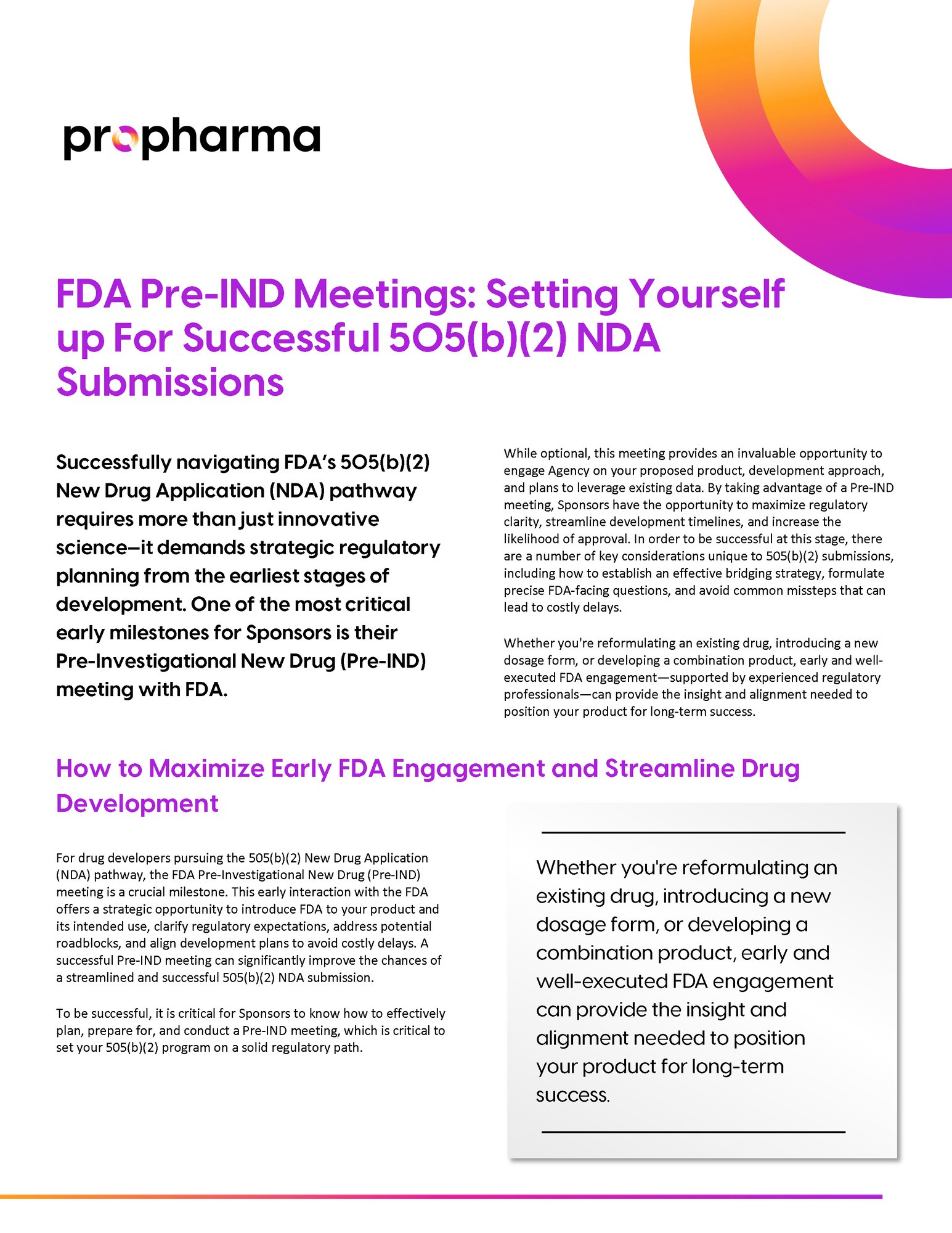For drug developers leveraging the 505(b)(2) pathway, the FDA Pre-Investigational New Drug (Pre-IND) meeting is a strategic opportunity that can shape the trajectory of an entire development program. These early interactions help Sponsors validate regulatory assumptions, align on data requirements, and establish a collaborative relationship with the FDA. When executed effectively, Pre-IND meetings de-risk development and pave the way for a streamlined New Drug Application (NDA) process.
Understanding the 505(b)(2) Pathway and the Role of Pre-IND Meetings
The 505(b)(2) NDA pathway allows drug Sponsors to reference existing data—such as published literature or prior FDA findings regarding safety and/or effectiveness—alongside new studies to support approval of new formulations, novel combinations, or new indications. Because this hybrid approach relies on a blend of original and referenced data, early FDA engagement is essential.
A Pre-IND meeting enables Sponsors to clarify how prior data will be bridged to their product, identify necessary clinical and nonclinical studies, and discuss Chemistry, Manufacturing, and Controls (CMC) considerations. These discussions help prevent development missteps that could lead to delays or additional costs down the road.
Keys to a Successful Pre-IND Meeting
Effective Pre-IND meetings require more than just regulatory knowledge—they demand proactive planning and strategic communication. Best practices include:
- Planning the timing carefully – Schedule the meeting once key product characteristics and preliminary data are defined.
- Submitting a clear, detailed meeting request – Clearly describe the product, development status, and specific feedback needed from FDA.
- Preparing a comprehensive briefing package – Expand on regulatory plans, bridging strategies, and available data; provide synopses of any proposed studies.
- Asking well-formulated questions – FDA will not respond to vague or open-ended queries. Each question should state a position and explicitly ask whether the FDA agrees.
- Engaging a cross-functional team – Include CMC, nonclinical, and clinical experts in the meeting to facilitate productive dialogue.
- Following up diligently – Summarize the meeting, submit Sponsor minutes to FDA, and ensure alignment with official meeting notes.
- Avoiding common pitfalls — such as incomplete packages, ambiguous questions, or neglecting CMC issues—is essential to maximize the value of this critical regulatory interaction.

Avoid Delays—Master the Pre-IND Meeting for 505(b)(2) NDAs
Unlocking your regulatory advantage begins with a successful Pre-IND meeting.
The Impact of FDA Layoffs on Pre-IND Meetings
Recent FDA layoffs—particularly those affecting scientific, regulatory, and project management staff—have raised concerns about the Agency's capacity to handle the volume and complexity of regulatory interactions. The Office of New Drugs (OND) and other critical review divisions are reportedly operating under staffing constraints, potentially leading to:
- Longer wait times for meeting approvals and feedback
- Increased likelihood of written responses only, instead of face-to-face or virtual meetings
- Delays in reviewing briefing packages and issuing meeting minutes
- Reduced availability of FDA staff to participate in cross-disciplinary discussions
For Sponsors, these developments underscore the importance of preparation and precision. Now more than ever, it is critical to:
- Submit complete, well-organized meeting requests and briefing packages to minimize back-and-forth and reduce review burden on FDA staff.
- Focus questions on key decision points where FDA input is essential to advance development.
- Engage regulatory professionals with FDA experience to anticipate reviewer expectations, avoid missteps, and craft compelling, review-ready documents.
- Follow up strategically by submitting clear meeting minutes and clarifying any misalignments promptly to prevent future confusion.
Why FDA Experience Matters Now More Than Ever
As FDA undergoes significant organizational change, Sponsors must navigate not only the regulatory requirements but also the evolving operational realities of the Agency. In this environment, guidance from professionals who have extensive experience working with FDA and maintain a deep, firsthand understanding of its processes and people, or those who have actually worked inside FDA has never been more critical.
Experts with direct FDA experience bring unique insight into:
- How the Agency thinks and prioritizes review activities
- Which details matter most to FDA reviewers
- How to frame data and questions for the most constructive feedback
- What internal dynamics may affect meeting outcomes or review timelines
These professionals also understand how to anticipate and adapt to changes in Agency behavior, ensuring Sponsors stay aligned with expectations even as internal FDA resources fluctuate.
Partnering with experienced consultants doesn’t just improve the quality of submissions—it increases the likelihood of meaningful, timely engagement with FDA and keeps your development program on track.
Partnering for Success
An expertly conducted Pre-IND meeting can be the cornerstone of a successful 505(b)(2) NDA submission. In today’s resource-constrained regulatory environment, working with seasoned experts—especially those who have firsthand FDA experience—can make the difference between delay and acceleration.
ProPharma’s regulatory consultants bring decades of experience facilitating successful FDA interactions. Our team includes former FDA staff and industry veterans who know how to navigate agency expectations, streamline submissions, and drive development success.
ProPharma: The World's Leading Regulatory Consultancy
Contact us today to learn how we can help you prepare for a high-impact Pre-IND meeting and keep your development timeline on track—even amid ongoing FDA disruptions.
TAGS: Food & Drug Administration (FDA) Investigational New Drug (IND) New Drug Application General Regulatory FDA Submission FDA Meetings Regulatory Sciences

